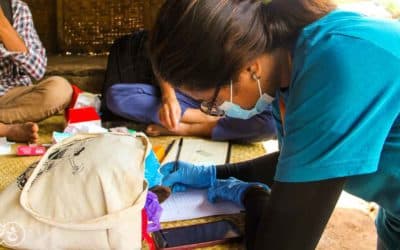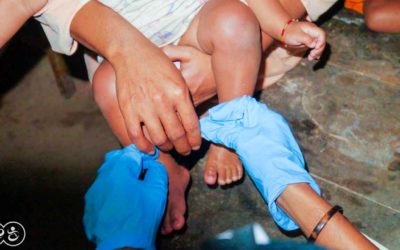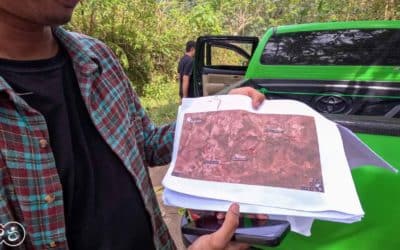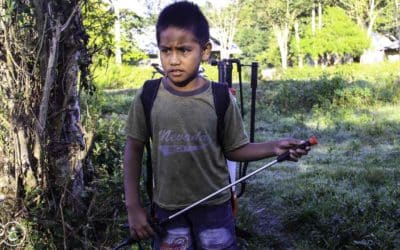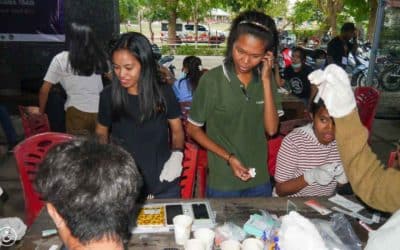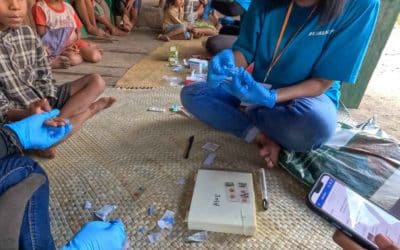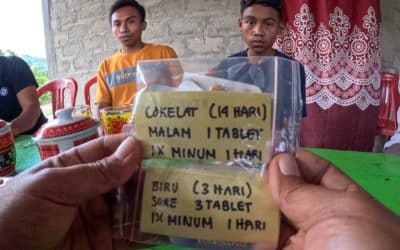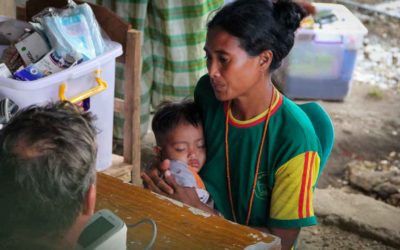In this poignant narrative, Alex Wettstein, founder of Fair Future, takes us into the trenches of the foundation’s work in East Sumba. From combating rampant diseases like malaria to navigating the glaring absence of international aid, Fair Future’s commitment is unwavering. A must-read to understand the arduous yet imperative mission to bring medical equity to one of the most impoverished regions in Southeast Asia.
In the scattered hills of East Sumba, 5,300-litre ferrocement tanks collect each drop of rain. Families help build and maintain them. Children drink safely, and women no longer have to carry 20-kilo jerrycans for hours. Water near the house is a primary source of health care.
Donate
Support Care
Programs
All projects
Quick News
Field updates
Stories
Field stories
Responding rapidly to medical emergencies in remote villages, saving lives through urgent care.
ZeroMalaria Report: The Ongoing Fight for Malaria Control in East Sumba
Fair Future’s ZeroMalaria Report illuminates the organization’s impactful but ongoing battle against Malaria in East Sumba. The multi-faceted approach includes clean water infrastructure, community education, and empowerment. Learn how these efforts are making a tangible difference but also underscore the long journey ahead
Support #TruckOfLife: Your Kilometer Makes the Difference
In the remote corners of Eastern Indonesia, each kilometer counts. Fair Future’s #TruckOfLife isn’t just a vehicle; it’s a lifeline to communities plagued by diseases like malaria and tuberculosis. With just CHF 0.56 per kilometer, you can be a part of this transformative journey. Your donation brings vital medical care, clean water, and a shot at a healthier future to those who need it most. Join us in making every kilometer a kilometer of hope.
Zero Malaria: The Stickers That Save Lives in East Sumba
This New “Picture of the Day” highlights much more than a simple sticker; it reveals a crucial component of our ongoing fight against malaria. Within Fair Future’s #ZeroMalaria program, our social and medical teams dedicate their expertise and energy to affixing these stickers to the walls of homes in the villages and regions of East Sumba where we work. These stickers are not just markers but vital indicators in our overall approach to protecting and educating the most vulnerable communities.
In the remote villages of East Sumba, Indonesia, a simple sticker can mean the difference between life and death. As part of Fair Future’s Zero Malaria program, these stickers are affixed to the walls of homes, serving as a visual indicator of our comprehensive approach to malaria control.
In the battle against malaria, we don't overlook any details. From microscopic examinations to stickers on walls, every action is a step towards a malaria-free future. These stickers are not just adhesives; they are badges of education, prevention, and hope.
Family Member Detection: Early diagnosis is crucial in regions like East Sumba, where malaria is rampant. Our teams employ optical microscopic examinations to visualize plasmodia in patients' thick or thin blood smears. We also utilize Rapid Diagnostic Tests for Malaria (TDR).
Indoor Residual Spraying (PID): We conduct Indoor Residual Spraying (PID) in every home across the villages. This involves the regular application of long-lasting chemical insecticides on the inner walls of houses. The insecticide remains effective for several months, killing mosquitoes that come into contact with it.
Larvicides: Regular application of microbial or chemical insecticides to water bodies or reservoirs is another crucial aspect. The goal is to reduce the adult mosquito population by killing the immature aquatic forms, thereby limiting their development into adults.
Bed Nets: The distribution of insecticide-treated bed nets (MII) is essential in our fight against malaria. These nets have proven highly effective in reducing malaria-related deaths and illnesses.
Environmental Surveillance: We also pay close attention to the living conditions in these areas. Factors like inadequate sanitation facilities, unsanitary conditions, stagnant water, and areas where animals like pigs and water buffaloes are kept can significantly contribute to mosquito proliferation.
This is why the sticker takes on such importance. It informs villagers whether a particular home has been treated, whether its inhabitants have undergone screening and whether they have been educated on protecting themselves from the disease.
Thank you very much for your support.
Alex Wettstein – Fair Future Foundation medico-social camp in East Sumba – Rumah Kambera, Lambanapu, 5th of October, 2023.
The #ZeroMalaria Mission: Testing East Sumba’s Population in Extreme Conditions
Embark on a journey with the Fair Future Foundation’s groundbreaking #ZeroMalaria program, aimed at eradicating malaria in East Sumba, Indonesia. This ambitious initiative seeks to test at least 87% of the local population, even in the most remote and challenging terrains. Discover how our specialized socio-medical teams navigate logistical hurdles, from electricity shortages to extreme weather conditions, to conduct tens of thousands of tests.
Behind the Scenes: Fair Future’s Anti-Malaria Effort in East Sumba
Fair Future Foundation, in collaboration with Kawan Baik and Sumba Volunteer, is taking bold steps to eradicate malaria in one of the world’s most affected regions—East Sumba, Indonesia. This comprehensive program aims to serve tens of thousands of people, focusing on early diagnosis and effective treatment. With more than 10 tons of medical equipment and a dedicated team, we are committed to this cause as a moral obligation. Read on to discover the intricate details of this life-changing initiative.
Rambu Mirna’s Battle: Fight against malaria in East Sumba’s Remote Areas
Embark on a profound journey alongside Rambu Mirna as she courageously battles malaria in the heart of remote East Sumba, where healthcare is a distant dream. Dive into the remarkable story of resilience and hope, and discover how Fair Future Foundation’s #ZeroMalaria initiative is not just saving lives but also transforming entire communities. Join us in this life-changing narrative of overcoming adversity and restoring futures in the most isolated corners of Indonesia.
East Sumba Pest Crisis: Human & Environmental Health At Stake
The pest crisis in East Sumba transcends agricultural ruin, posing a severe threat to human health, psychological well-being, and environmental integrity. Fair Future Foundation takes a deep dive into this grim humanitarian emergency, advocating for holistic solutions. From acute health risks to wildlife mortality, this article sheds light on the critical need for a united front. Explore our data-driven insights and learn how you can contribute to developing ethical, effective solutions.
Volunteers: The Cornerstone of Zero Malaria Initiative in East Sumba
In the fight against malaria in East Sumba, volunteers stand at the front lines, embodying hope, dedication, and community-driven action. Discover how these everyday heroes, contributing to Fair Future Foundation’s #ZeroMalaria initiative, are changing the landscape of public health. Their hands administer life-saving treatments, their voices educate vulnerable communities, and their efforts are the cornerstone of a better, healthier future.
#ZeroMalaria Campaign: Fair Future’s Life-Saving Mission
Championing the #ZeroMalaria Cause: Fair Future’s Tireless Efforts in Sumba East. This image reflects our unwavering commitment to the #ZeroMalaria cause. Together, we’re illuminating a path to a malaria-free future. Each test, done twice for accuracy, symbolises hope in the fight against malaria. Our teams also collect essential socio-medical data to track progress.
In the heart of one of Indonesia’s poorest and most disadvantaged regions, as well as one of the highest malaria prevalence areas in the world, Fair Future, in collaboration with Kawan Baik and Sumba Volunteer, is waging an unrelenting battle against the deadly scourge of malaria. Under the banner of #ZeroMalaria, this vital campaign is not just about medical intervention; it’s about transforming lives and ensuring every community member has a chance at a healthier future.
The Challenge of Malaria in Sumba East: Sumba East is a region where basic amenities like electricity, clean water, and sanitation facilities are virtually non-existent. Here, people face a daily struggle for survival against malaria and various other infectious diseases. Malaria, in particular, poses a significant threat to the lives of the local population.
Malaria is transmitted through the bite of infected female Anopheles mosquitoes and can have devastating consequences if left untreated. The disease can rapidly progress from fever and chills to severe anaemia, organ failure, and even death. Vulnerable groups, such as pregnant women and children, are at higher risk.
Fair Future’s Double-Testing Approach: Precision is paramount in the battle against malaria. Fair Future’s dedicated medical teams, including doctors, nurses, and laboratory technicians, work tirelessly to ensure that every case is accurately diagnosed and treated.
Our teams conduct tens of thousands of malaria tests, and each test is done twice – once using rapid diagnostic tests and another through blood tests analyzed using microscopes, all performed directly in the field. This rigorous double-testing approach ensures the highest level of accuracy, especially in an area where access to modern medical facilities is severely limited.
Collecting Socio-Medical Data: Beyond diagnosis and treatment, Fair Future recognises the importance of comprehensive data collection to guide its efforts. The captivating photo accompanying this article shows our teams diligently gathering socio-medical data from every family member and villager. This data is entered into Fair Future’s proprietary application, meticulously developed and funded by the organisation. The application serves as a crucial tool for tracking and tracing the regions where we implement the #ZeroMalaria program.
The Urgent Need for #ZeroMalaria: It’s important to remember that malaria remains a significant threat in regions like Sumba East, where people continue to lose their lives to this preventable and treatable disease. Pregnant women and children are particularly vulnerable.
The #ZeroMalaria program represents a lifeline for these communities, providing medical care, education, and awareness about malaria prevention. Fair Future is committed to ensuring that no one in Sumba East loses their life to malaria, and your support is instrumental in achieving this goal.
In closing, the battle against malaria in East Sumba is ongoing, and the stakes couldn’t be higher. Through #ZeroMalaria, Fair Future is determined to change the narrative, transform these communities, and to save lives. Join us in this life-saving mission!
Thank you very much for your support.
Alex Wettstein – Fair Future Foundation medico-social camp in East Sumba – Rumah Kambera, Lambanapu,
September 21st, 2023.
Combatting Malaria in Sumba: A Crucial Health Battle
This new "picture of the day", shows a 14-year-old young kid suffering from malaria for the second time, whom we have tested twice and is receiving his medical treatment. We explained that he must take these medications every day for fourteen days. We explain why and the risks if he doesn't. A nurse is present and will ensure regular check-ups to ensure everything is going well for him.
The fight against malaria in Sumba is an intense and crucial battle for the population's health. Every positive case, like that of this young man from Lulundilu, Kecermatan Mahu, East Sumba, requires immediate medical intervention and rigorous treatment that extends over a period of 14 days without interruption.
This young man belongs to a large family of seven siblings, all of whom have been affected by malaria before. Although he is fortunate not to have lost any close family members to this disease, it is essential to understand that malaria is wreaking havoc in this region. Our team visited his home and conducted two tests to confirm his infection, first with a rapid test and then with blood tests and microscopic analysis. Both times, the results were positive, indicating that he was carrying the Plasmodium falciparum parasite.
As with all malaria cases, Fair Future takes over the medical treatment. It is crucial that this young man diligently follows his treatment because the risks to his life are extremely high if he does not. That's why we have mobilized staff from the nearest healthcare centre, Puskesmas Mahu, to ensure that he receives his medical treatment appropriately and monitor his progress.
It is important to emphasize that since the beginning of 2023, in Sumba alone, 18 pregnant women have lost their lives due to malaria due to a lack of screening, information, proper medical care, and appropriate treatment. This tragedy highlights the need to strengthen our fight against malaria and ensure equitable access to medical care for all community members.
The Fair Future team remains determined to do everything possible to end this threat to public health and ensure that every individual has access to the necessary medical care to combat malaria and other serious illnesses. Your support and donations are essential for this mission's success and saving lives.
Thank you very much for your support.
Alex Wettstein – Fair Future Foundation medico-social camp in East Sumba – Rumah Kambera, Lambanapu,
September 21st, 2023.
Malaria in East Sumba: All villages turned Red!
This new "Picture of the Day" shows you a brave but sad mom who asks for care for her little boy. She is a courageous but sad mother who seeks care for her little boy, who suffers from Malaria. With pain and more than 40 fever, He is the example of the "typical patient" here: Under five years old, this family lives in an ultra-rural and marginalized area. She is poor, and they don't have access to medical care or enough food and clean water; They don't have toilets either. Moreover, the whole village does not have access to electricity.
The medical staff of Kawan Baik and Fair Future Foundation bring him relief and medicine to lower his fever and get better as soon as possible. We also talk to the mother and give her good advice.
Let me re-explain to you what malaria is and why this disease is hazardous, and the categories of people it affects in the first place:
Malaria is caused by parasites transmitted by the bites of infected mosquitoes. Although anyone can get malaria, specific categories of people are more susceptible to severe illness and complications. We find that the impact of malaria varies by geographic region and local health infrastructure. Our efforts to fight malaria focus on prevention through measures such as the establishment of the Primary Medical Care Program (PMC), mosquito nets, spraying in villages (fogging), and learning to wash with an "ani-malaria or disinfectant" soap, among others.
1. First, children under five: This is because young children have a weaker immune system and have not yet developed immunity to disease. They are more likely to have serious symptoms and complications, including severe anaemia and cerebral malaria, which can be life-threatening. This is the case here: Infant mortality is very high in ultra-rural areas and marginalized populations of East Sumba.
2. But also pregnant women: Of course, malaria can have adverse effects on both the mother and the unborn child. Pregnant women are at an increased risk of developing severe malaria, leading to complications such as maternal anaemia, spontaneous abortion, stillbirth or low birth weight infants. I spoke to you about a similar case in Kabanda, right?
Public health interventions to provide vital advice to the most affected populations via the #kawansehat program are essential. You have to be close to people if you want to advise them on the best way to have a healthier life.
3. Ultra-rural and marginalized populations: Communities living in rural and remote areas, often with limited access to health care, such as here in East Sumba, are disproportionately affected by malaria. Factors such as poverty, lack of knowledge about preventive measures and limited access to health services contribute to malaria's higher prevalence and impact in these communities.
4. Immunocompromised people: People with weakened immune systems, such as those living with HIV/AIDS, are more likely to contract severe malaria. We are also talking about people with chronic illnesses. Malaria can also aggravate the progression of HIV infection. And concerning the rate of HIV-positive people here is also very high, even with very few tests being conducted.




